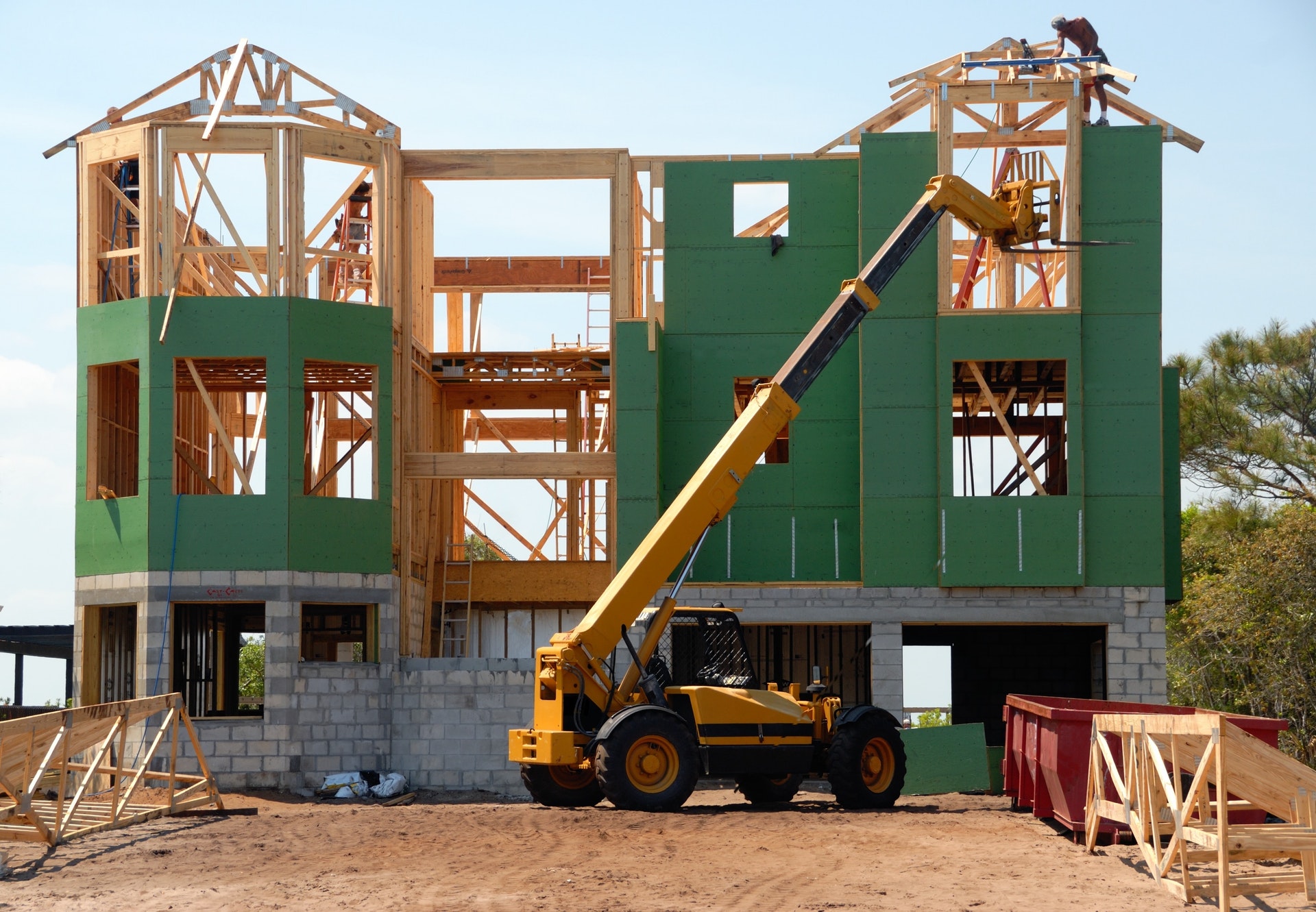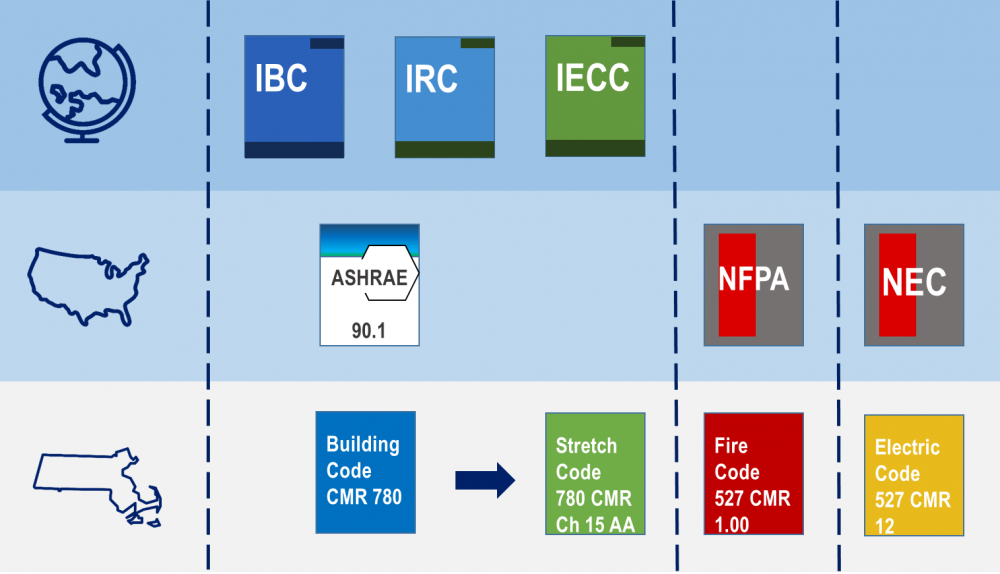
The building sector is the second-largest source of greenhouse gas (GHG) emissions in Massachusetts. With increasing awareness of the negative health impacts of inefficient buildings and carbon emissions, many municipalities have identified GHG emissions in buildings as an issue that they would like to address more fully within their communities.
While cities and towns can influence emissions reductions in the building sector through municipal plans and zoning, local regulations must comply with the Massachusetts State Building Code (MSBC). This can be a challenge when municipalities want to support community-wide GHG reductions in the building sector by requiring developers to follow high performance building standards that may exceed the MSBC, such as Passive House or Architecture 2030. But municipalities can have a direct impact on the building code at the local, state, and national levels.
What impact can municipalities have on the Massachusetts State Building Code?
Local Impact
Municipal code officials, such as inspectional services staff and fire chiefs, interpret the state code upon implementation. This includes at least two points of action: one at the plan review and another at the inspection.
State Impact
Submit Comments to the Board of Building Regulation and Standards: As amendments to base codes are proposed, cities and towns can submit comments to the Board of Building Regulation and Standards (BBRS), which oversees the MSBC and certifies building inspectors, and the Board of Fire Prevention Regulations (BFPR). Municipalities can also attend public hearings where these amendments are reviewed and adopted.
Adopt the Stretch Energy Code: Massachusetts municipalities have had the option to adopt the Stretch Energy Code (780 CMR Ch15) since the Green Communities Act was adopted in 2008. Currently, 250 cities and towns in the State are Stretch Code communities. However, the Stretch Code has not been updated regularly, and the Base Building Energy Code (CMR 780) has largely caught up. Municipalities can provide feedback to the BBRS on the need for a more efficient Stretch Code in person at the BBRS public hearings, which are usually scheduled for May and November, and in written comments. One potential option that the BBRS, cities and towns, and other stakeholders may want to consider is a tiered stretch energy code that provides municipalities with an option to opt into a more advanced code, such as a net zero stretch energy code, that more fully meets the need for communities to construct high-performance buildings.
National Impact
Vote on the International Energy Conservation Code: Municipalities can also play an influential role at the national level by advocating for a more energy efficient code during the code development cycles for the international and national codes. These actions have a positive downstream effect, as state codes here in Massachusetts and the majority of other states are based off of the national and international codes. Every municipality in Massachusetts has the opportunity to vote as part of the International Code Council (ICC). A specific application of this influence is the upcoming vote on the International Energy Conservation Code (IECC).
Voting for the International Energy Conservation Code is critical
MAPC is working with the Energy Efficient Codes Coalition (EECC) and other partners to prepare communities to be involved in the next cycle of the IECC, which will create the 2020 ICC codes and standards largely adopted by Massachusetts and much of the rest of the nation. A more efficient energy code nationally translates into a more efficient building energy code in Massachusetts because the BBRS is mandated to update our state building code with each new cycle of the IECC.
Proposed code amendments for this iteration of the IECC include pathways to improve building energy efficiency by at least five percent over the current code, with a pathway for 10 percent. There is also an important proposal to codify an optional Appendix G for net zero buildings. These updates are vital as the previous two cycles of the IECC did not have significant improvements in energy efficiency.
The barrier for adopting these energy efficient proposals to the IECC is relatively low EECC estimates that we would only need about 400 votes nationwide to ensure these measures pass. Concurrent efforts are happening in other regions around the country. We think this gives Massachusetts municipalities an excellent opportunity to have an outsized impact on this code.
Why are better building codes good for the climate?
Improvements in building codes are an efficient way to stem carbon emissions. According to Architecture 2030, buildings account for 40 percent of GHG emissions currently and the building stock globally is anticipated to double by 2060. The building code effectively sets a floor for energy efficiency for new construction. By raising this floor, we can prevent GHG emissions over the 50-100 year lifetime of these structures. The past two code cycles for the IECC have achieved less than one percent in energy savings as opposed to the 18 percent achieved between the 2009 and 2012 codes. With a dedicated effort, we can ensure that we get back on track for substantial carbon reductions from the building sector.
How do code cycles work?
The International Code Council (ICC) splits their code development into two cycles, A and B, which occur in two consecutive years. In each code cycle, there is a window for municipal staff to renew their membership and register to vote. For the upcoming code cycle, which will determine the next building energy code to be adopted in Massachusetts in 2021, registration opens in January and must be completed by March 29,2019. Municipal staff can learn more about the registration process and register to vote at https://www.iccsafe.org/voter-validation-process-faqs, or renew membership at https://www.iccsafe.org/membership/membership-renewal. Feel free to contact MAPC’s Clean Energy Department for more information on this process.
Throughout the summer, proposed amendments to the code for that year’s cycle are reviewed by the code board for each individual standard. For example, a board reviews proposals for the International Residential Code (IRC). These boards vote on whether to support or reject each proposal, and then all proposals move to the larger group of all registered voters to approve or reject in the fall. MAPC will share guidance for how to vote for a more energy efficient code come fall.
International, National, and State Codes

The language for our state building, electric, and fire codes come from international and national codes. Massachusetts makes unique amendments to some of these broader codes and standards as we adopt them to adapt the language to better suit our needs as a state. For instance, the Massachusetts State Building Code (CMR 780) is based on language from the International Building Code (IBC), the International Residential Code (IRC), the International Energy Conservation Code (IECC), and the American Society of Heating, Refrigerating and Air-Conditioning Engineers standards (ASHRAE 90.1). Since each of these codes operate on different cycles of adoption, updating our state codes is an iterative and ongoing process.
Learn More and Get Involved
To learn more about the significant climate impacts that a more efficient building energy code can have and the relatively simple national process in which your community can participate, those interested in registering to vote on the IECC can schedule a call for no-cost technical assistance with MAPC.
Stay tuned for more information on how to get involved, and resources to learn more on MAPC’s Codes for Climate Webpage. Also, sign up here to receive MAPC’s upcoming building codes newsletter to learn more from about code cycles and implementation.


